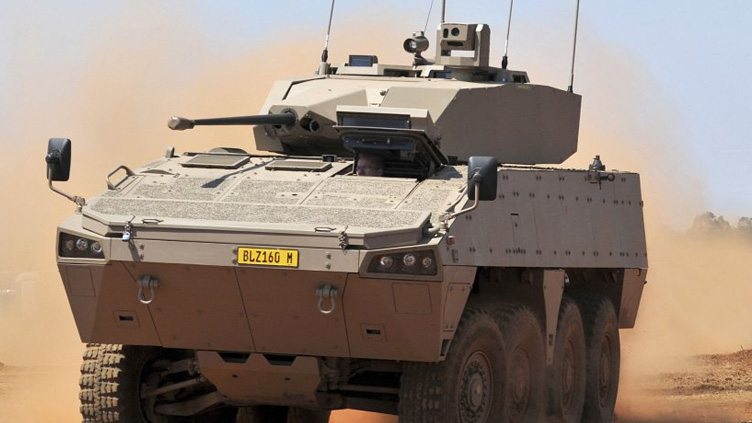Stephan Burger, the CEO of Denel Land Systems (DLS) says the industrialisation at its facilities in Lyttelton has already started and the manufacturing will commence in early 2015. The full fleet, which will replace the Ratels that are currently used, will be delivered by end 2022.
“The new Badger ICV is a combination of a locally-designed turret and a Finnish designed vehicle, customised for the unique South African conditions. The system will be produced locally and represents the apex of the South African defence industry,” says Mr Burger.
“It will provide South Africa’s soldiers with unrivalled firepower, mobility and maximum armoured protection. The SANDF will have an adaptable and flexible vehicle that can be used with equal confidence in both high-intensity warfare and peace support operations.”
Mr Burger says the Badger is the culmination of decades of research, testing and development that produced a mature vehicle designed to meet the requirements of the SA Army.
The Badger programme will contribute to a number of key objectives set by Denel, as a state-owned company and a strategic national asset, namely:
- It confirms Denel’s role as South Africa’s premier producer of world-class defence products and systems and a strategic partner of the SANDF. The Badger is a “best-of-breed” infantry combat vehicle able to compete on equal terms with any other vehicle in its class.
- This is the most significant defence contract ever signed with a South African company. It demonstrates the Government’s confidence in the ability of the local industry to produce frontline equipment for a modern defence force.
- The Badger contract strengthens South Africa’s strategic independence in the fields of defence and security-related products and support.
- Through this programme Denel makes another decisive contribution to meet the country’s industrial objectives with regards to advanced manufacturing, skills development, job creation and foreign-currency earnings due to export potential.
- The Badger will contribute towards the long-term sustainability of the entire South African defence industry. It will focus global attention on the unique skills, innovation and capabilities within the local defence sector and open the door to future partnerships and joint ventures.
- The contract will create and retain at least 2 000 jobs in the downstream South African defence industry among local sub-contractors as well as 200 direct jobs at Denel Land Systems. These jobs cover a wide spectrum from graduate engineers, system designers and artisans to skilled and semi-skilled workers.
Following an open tender process Denel Land Systems was awarded the contract for the development of a new generation infantry combat vehicle by Armscor in 2007. The SANDF required a new vehicle to replace the 30-year old Ratels in its mechanised infantry units.
The first prototype vehicle was delivered to Armscor and the SANDF in 2010. This vehicle is currently being subjected to extensive testing and modifications to meet the changing requirements of the SANDF.
“This process also confirmed DLS’s position as a strategic incubator of high-tech skills and manufacturing and a leader on the African continent in innovative technologies,” says Mr Burger.
Up to 70% of the vehicle will be produced in South Africa using local skills, local manufacturing capacity, local defence technology and local subcontractors. The 8X8 vehicle is based on a platform developed by the Finnish defence contractor, Patria. During the manufacturing cycle the entire production will be migrated to South Africa.
In addition, the original design has been totally South Africanised to meet local requirements with regards to landmine protection, manoeuvrability and firepower. A unique feature of the Badger is its’ modular turret system, developed by DLS in five variants, namely Section, Command, Mortar, Missile and Fire Support models. A single turret structure, fitted with different weapon modules, will simplify the logistic support and reduce the cost of through-life support.
The Badger variants are equipped with either a 30mm externally-driven cam-operated cannon, a locally developed 60mm breech-loading long-range mortar both developed by DLS, a 12.7mm machine gun or the Ingwe anti-tank missile system developed by Denel Dynamics. These weapon systems are integrated into the DLS turrets.
Another Denel division, PMP, has developed the 30mm ammunition used by the Badger, complementing its existing range of world-class small-and medium calibre ammunition. This was done in tandem with the 30mm Cam-Gun, designed by DLS to be the main weapon system on the Badger.
Mr Burger says the recent involvement of South African troops in operations supporting the United Nations and the African Union again emphasised the need for protective mobility on the battlefield which the Badger now provides.
In peace-enforcement operations the vehicle enables soldiers to dismount and interact freely with the civilian population. But the same vehicle also provides troops with effective protection and offensive firepower in high-intensity warfare.
The development of the Badger has been a model of efficiency for the South African manufacturing industry. With a budget of R1.3 billion Denel Land Systems and its sub-contractors have, within five-and-a-half years:
- Developed five complementary variants of the Badger ICV with different armament and interior fits.
- Developed an enhanced armour envelope including a new flat-bottom mine-protection technology for the Badger.
- Developed two new weapons, an externally driven 30 mm cannon and a breech-loaded 60 mm mortar and the related ammunition for two of the variants.
- Tested five complete Badger vehicles.
- Developed the driver and turret crew training simulators for the Badger.
- Developed the logistic support system for the Badger.
“Although the development phase is still in process, we are confident that the Badger will generate considerable international interest in the vehicle and open a number of prospects for future exports that could result in the injection of foreign direct investment into South Africa,” says Mr Burger.










